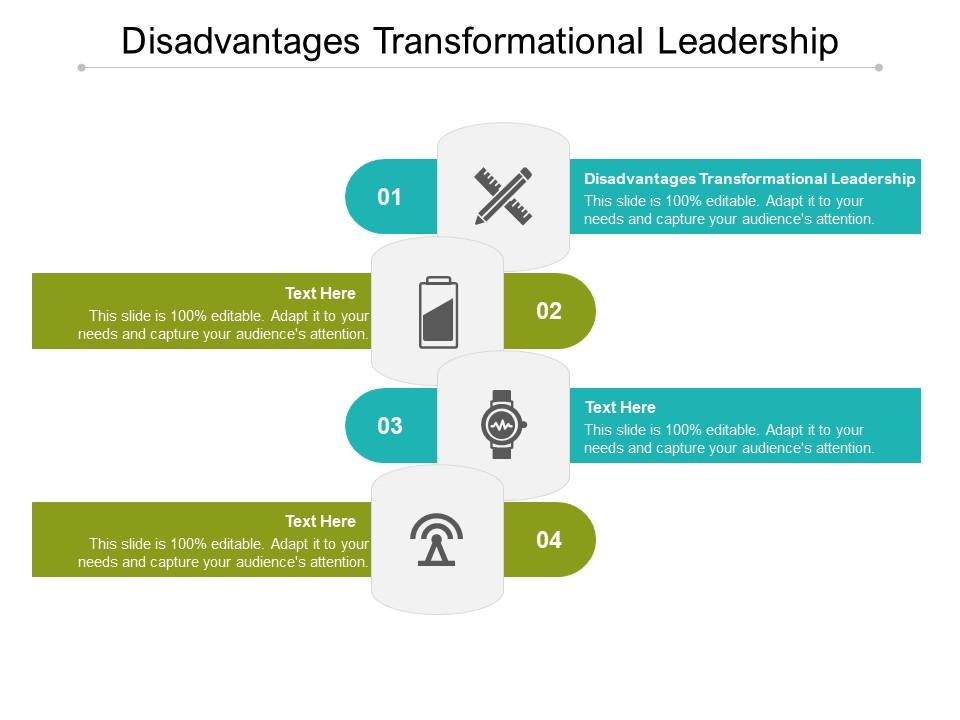Disadvantages of Transformational Leadership Theory

While transformational leadership theory offers numerous benefits, it also has some potential disadvantages and limitations, including:
-
Dependency on the Leader:
- Transformational leadership relies heavily on the charisma and influence of the leader. This can create a dependency on the leader's personality and vision, making the organization vulnerable if the leader leaves or is unable to maintain their influence.
-
Potential for Manipulation:
- Transformational leaders' strong influence and persuasive abilities can sometimes be used inappropriately or manipulatively. Leaders may exploit their followers' trust and loyalty for personal gain or to advance their own agendas, rather than the organization's best interests.
-
High Expectations:
- Transformational leaders often set high expectations and standards for their followers, which can lead to stress, burnout, or feelings of inadequacy among team members. Constant pressure to achieve lofty goals may be unsustainable and can negatively impact morale and well-being.
-
Resistance to Change:
- Despite transformational leaders' efforts to inspire and motivate change, some individuals may resist or reject the proposed vision or direction. Resistance to change can arise due to fear of the unknown, loss of control, or perceived threats to status quo, leading to challenges in implementation and execution.
-
Incompatibility with Certain Cultures or Contexts:
- Transformational leadership may not be suitable for every organizational culture or context. In hierarchical or authoritarian cultures, for example, followers may be less receptive to participative decision-making and empowerment, which are central to transformational leadership.
-
Potential for Burnout:
- Transformational leaders often invest significant time and energy in inspiring and supporting their followers, which can lead to burnout if not managed effectively. The pressure to maintain high levels of engagement and performance may take a toll on the leader's well-being and work-life balance.
-
Overemphasis on Visionary Leadership:
- Transformational leadership theory places a strong emphasis on visionary leadership and charisma, which may overshadow other important leadership qualities and behaviors, such as strategic planning, execution, and organizational management.
-
Difficulty in Measuring Impact:
- Assessing the effectiveness of transformational leadership can be challenging due to its qualitative nature and focus on intangible outcomes such as inspiration and motivation. Measuring the impact of transformational leadership on organizational performance and outcomes may require subjective assessments or indirect indicators.
-
Risk of Unrealistic Goals:
- Transformational leaders' emphasis on setting ambitious goals and pursuing visionary ideals may sometimes result in setting unrealistic or unattainable objectives. Failure to achieve these goals can lead to disappointment, disillusionment, and loss of credibility among followers.
-
Potential for Misalignment with Organizational Values:
- Transformational leaders' personal values and priorities may not always align perfectly with those of the organization. This misalignment can create tensions or conflicts between the leader's vision and the organization's goals, values, or stakeholders' interests.
While transformational leadership offers many advantages, leaders should be aware of these potential disadvantages and strive to mitigate them through self-awareness, ethical conduct, and effective leadership practices. Balancing visionary inspiration with practicality, accountability, and ethical considerations is essential for maximizing the benefits of transformational leadership while minimizing its drawbacks.
Thank you,
